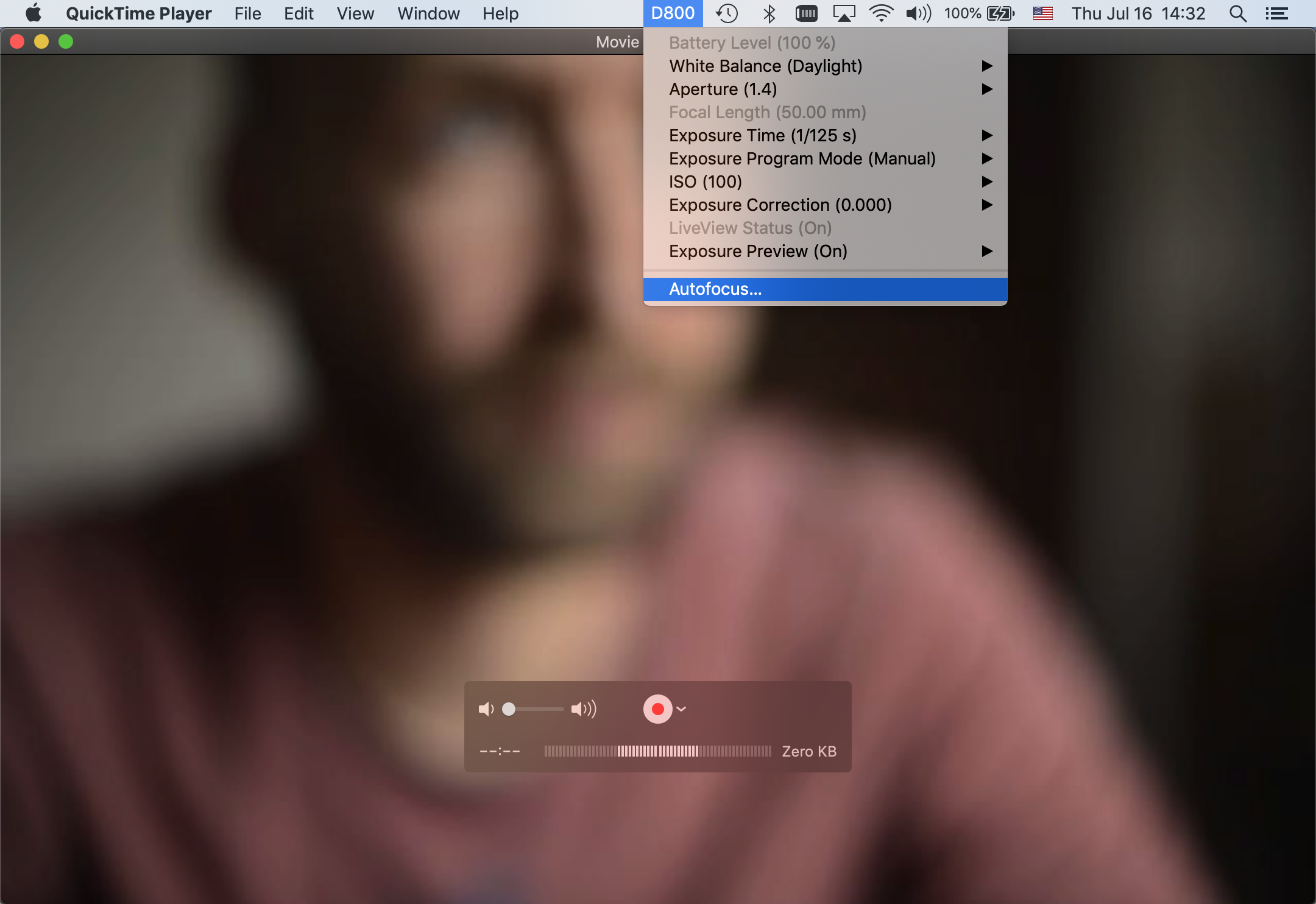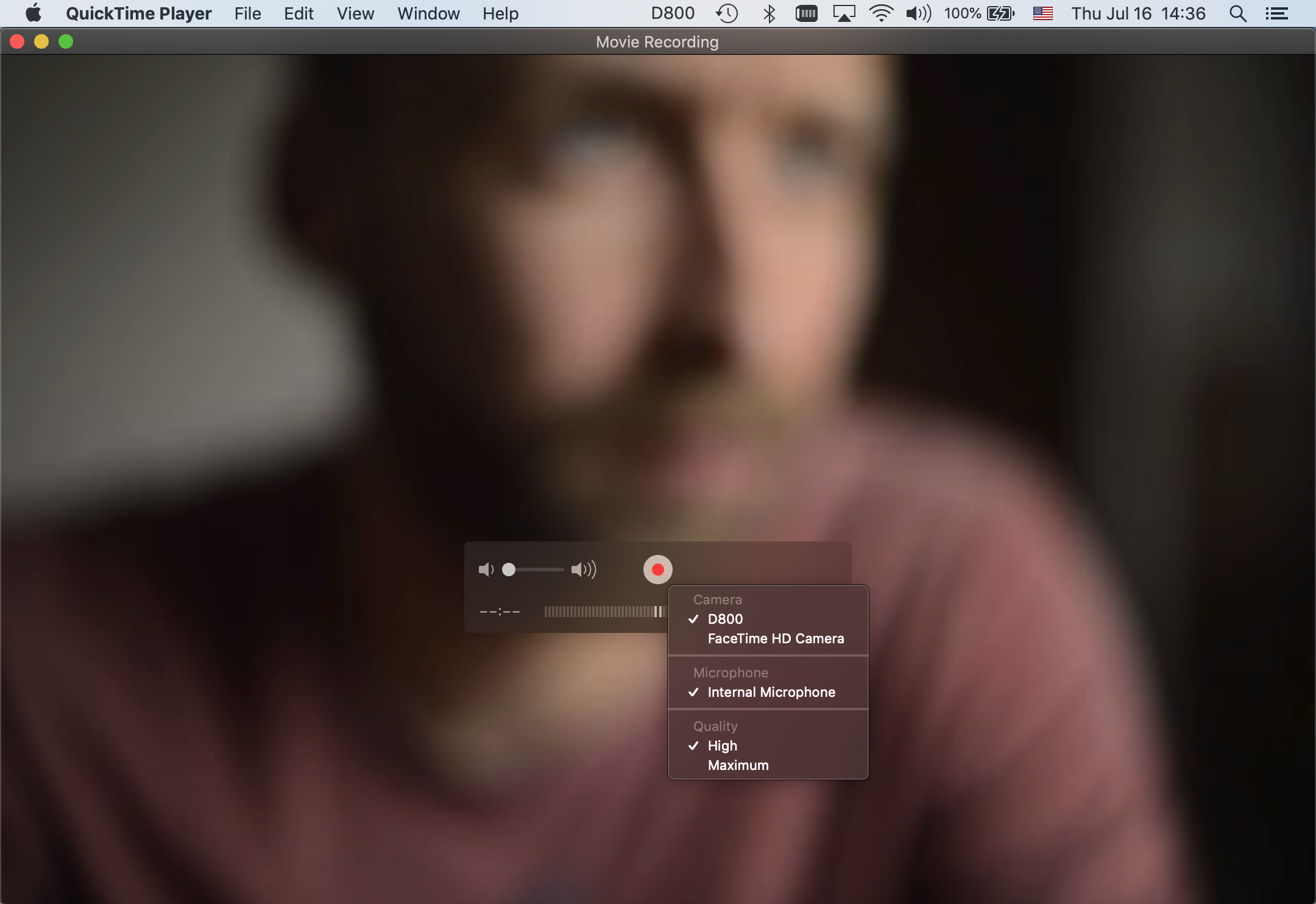Large sensor digital still cameras can provide an exceptionally good image for video conferencing, compared to most built-in web cameras.
This is a plugin to make compatible digital cameras available as webcams in video calls, for example in Zoom or Skype on macOS. It also allows control of camera settings from the computer to adjust exposure parameters and focus.
The project consists of a CoreMediaIO DAL plugin, and a preview app to test functionality.
Note: only video is currently captured, no audio.
A compatible camera connected via USB to a Mac running macOS / OS X 10.12 through 10.15.
Download and install the latest release from the PTP Webcam Homepage.
Installer packages for older releases are available from the Releases page of this project.
If you want to build from source, you need Xcode. You can build the project and the plugin should be automatically copied into /Library/CoreMediaIO/Plug-Ins/DAL to be available to the system. However, apps with Library Validation enabled will need to have codesigning disabled to be able to access the plugin, see the Known Issues section below.
Opening Quicktime Player and creating a New Movie Recording via File -> New Movie Recording, then selecting the camera source can be used to verify functionality. The camera needs to be plugged in and turned on, and it might take a few seconds to show up.
Quicktime Player works because it has Library Validation disabled out-of-the-box, unlike eg. Photo Booth, which has the capability to use different video sources, but is prevented from doing so because Library Validation is enabled.
Note: video quality in the camera selection drop-down menu must be set to Maximum to get a video resolution higher than 640x480.
If the camera is connected, a status bar item with the camera's model number should appear and can be used to change settings.
Delete the following files and reboot to uninstall PTP Webcam:
/Library/CoreMediaIO/Plug-Ins/DAL/PTPWebcamDALPlugin.plugin
/Library/LaunchDaemons/org.ptpwebcam.PtpWebcamAssistant.plist
/Library/LaunchAgents/org.ptpwebcam.PtpWebcamAgent.plist
The supported cameras and their capabilities are listed in CAMERAS.md. Cameras from Canon, Nikon, and Sony are currently supported.
macOS applications that have library validation enabled cannot load DAL plugins that have not been signed or signed by another developer. Therefore, some popular video conferencing tools do not work out of the box.
The easiest way to workaround is to remove the signature for the offending applications, but note that this might be affected by security settings on your system, and might require to relax security settings.
Status for an unknown app can be checked via codesign -d --entitlements :- /Path/to/App and if any entitlements show up, com.apple.security.cs.disable-library-validation needs to be among them:
<key>com.apple.security.cs.disable-library-validation</key>
<true/>
If it is not, codesigning has to be removed from the app and potentially its helper apps.
https://stackoverflow.com/a/62456259/4296447
Zoom version 5.1.1 and newer no longer has library validation issues. For older versions that do not show the plugin codesigning can be disabled:
codesign --remove-signature /Applications/zoom.us.app
Skype version 8.62.0.85 and newer no longer has library validation issues, and work out of the box.
Older versions of Skype have several helper apps inside its application bundle that might need code signing disabled.
codesign --remove-signature /Applications/Skype.app
cd /Applications/Skype.app/Contents/Frameworks
codesign --remove-signature Skype\ Helper.app
codesign --remove-signature Skype\ Helper\ \(Renderer\).app
Additional helpers might be named differently in different Skype versions.
codesign --remove-signature /Applications/Google\ Chrome.app
codesign --remove-signature /Applications/Google\ Chrome.app/Contents/Frameworks/Google\ Chrome\ Framework.framework/Helpers/Google\ Chrome\ Helper.app
codesign --remove-signature /Applications/Google\ Chrome.app/Contents/Frameworks/Google\ Chrome\ Framework.framework/Helpers/Google\ Chrome\ Helper\ \(GPU\).app
codesign --remove-signature /Applications/Google\ Chrome.app/Contents/Frameworks/Google\ Chrome\ Framework.framework/Helpers/Google\ Chrome\ Helper\ \(Plugin\).app
The PTP Webcam agent, which handles the low level camera interaction and user interface, logs debug messages to
/tmp/org.ptpwebcam.PtpWebcamAgent.stderr.log
and crash logs can be found at
~/Library/Logs/DiagnosticReports/
starting with PtpWebcamLaunchAgent
PTP Webam is incompatible with Canon's EOS Webcam Utility software, is Canon's software prevents PTP Webcam from accessing any attached camera. Therefore, /Library/CoreMediaIO/Plug-Ins/DAL/EOSWebcam.plugin has to be removed or deleted before PTP Webcam can work.
This project is open-source and free to use, but can be supported through Patreon.
If you'd like to contribute in another way, contact dognotdog directly.
The full license is available in LICENSE.md at the same location as this readme.
Copyright (C) 2020 Doemoetoer Gulyas
This program is free software: you can redistribute it and/or modify it under the terms of the GNU General Public License as published by the Free Software Foundation, either version 3 of the License, or (at your option) any later version.
This program is distributed in the hope that it will be useful, but WITHOUT ANY WARRANTY; without even the implied warranty of MERCHANTABILITY or FITNESS FOR A PARTICULAR PURPOSE. See the GNU General Public License for more details.
You should have received a copy of the GNU General Public License along with this program. If not, see https://www.gnu.org/licenses/.
Thanks to Marty Swartz for being the first to help testing additional cameras.
This work would not have been possible without other open-source work:

